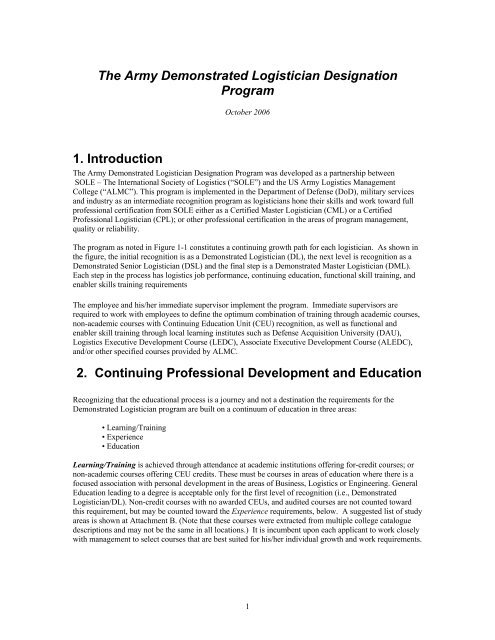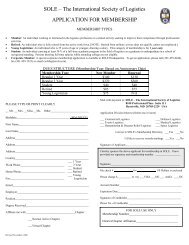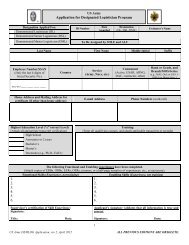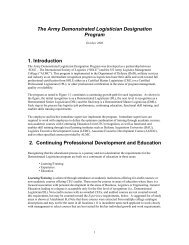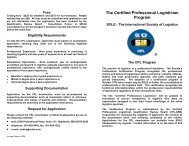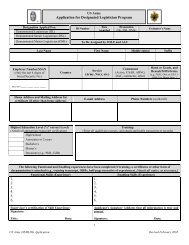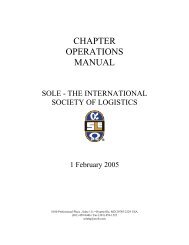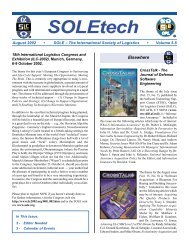The Demonstrated Logistician Designation Program
The Demonstrated Logistician Designation Program
The Demonstrated Logistician Designation Program
Create successful ePaper yourself
Turn your PDF publications into a flip-book with our unique Google optimized e-Paper software.
<strong>The</strong> Army <strong>Demonstrated</strong> <strong>Logistician</strong> <strong>Designation</strong><br />
<strong>Program</strong><br />
October 2006<br />
1. Introduction<br />
<strong>The</strong> Army <strong>Demonstrated</strong> <strong>Logistician</strong> <strong>Designation</strong> <strong>Program</strong> was developed as a partnership between<br />
SOLE – <strong>The</strong> International Society of Logistics (“SOLE”) and the US Army Logistics Management<br />
College (“ALMC”). This program is implemented in the Department of Defense (DoD), military services<br />
and industry as an intermediate recognition program as logisticians hone their skills and work toward full<br />
professional certification from SOLE either as a Certified Master <strong>Logistician</strong> (CML) or a Certified<br />
Professional <strong>Logistician</strong> (CPL); or other professional certification in the areas of program management,<br />
quality or reliability.<br />
<strong>The</strong> program as noted in Figure 1-1 constitutes a continuing growth path for each logistician. As shown in<br />
the figure, the initial recognition is as a <strong>Demonstrated</strong> <strong>Logistician</strong> (DL), the next level is recognition as a<br />
<strong>Demonstrated</strong> Senior <strong>Logistician</strong> (DSL) and the final step is a <strong>Demonstrated</strong> Master <strong>Logistician</strong> (DML).<br />
Each step in the process has logistics job performance, continuing education, functional skill training, and<br />
enabler skills training requirements<br />
<strong>The</strong> employee and his/her immediate supervisor implement the program. Immediate supervisors are<br />
required to work with employees to define the optimum combination of training through academic courses,<br />
non-academic courses with Continuing Education Unit (CEU) recognition, as well as functional and<br />
enabler skill training through local learning institutes such as Defense Acquisition University (DAU),<br />
Logistics Executive Development Course (LEDC), Associate Executive Development Course (ALEDC),<br />
and/or other specified courses provided by ALMC.<br />
2. Continuing Professional Development and Education<br />
Recognizing that the educational process is a journey and not a destination the requirements for the<br />
<strong>Demonstrated</strong> <strong>Logistician</strong> program are built on a continuum of education in three areas:<br />
• Learning/Training<br />
• Experience<br />
• Education<br />
Learning/Training is achieved through attendance at academic institutions offering for-credit courses; or<br />
non-academic courses offering CEU credits. <strong>The</strong>se must be courses in areas of education where there is a<br />
focused association with personal development in the areas of Business, Logistics or Engineering. General<br />
Education leading to a degree is acceptable only for the first level of recognition (i.e., <strong>Demonstrated</strong><br />
<strong>Logistician</strong>/DL). Non-credit courses with no awarded CEUs, and audited courses are not counted toward<br />
this requirement, but may be counted toward the Experience requirements, below. A suggested list of study<br />
areas is shown at Attachment B. (Note that these courses were extracted from multiple college catalogue<br />
descriptions and may not be the same in all locations.) It is incumbent upon each applicant to work closely<br />
with management to select courses that are best suited for his/her individual growth and work requirements.<br />
1
<strong>The</strong> Experience category is comprised of two skill sets, Functional and Enabling.<br />
A . Functional Skills: <strong>The</strong> courses required for this category are generally associated with the<br />
performance of the logistics functions and directly related to them. As previously mentioned,<br />
DAU as well as other DoD schools (ALMC, AFIT) offer courses in this area. Courses may be<br />
offered on-line or in residence and must be directly applicable to the employee in the specific<br />
logistics skill areas as described in Table 2 and Attachment A.<br />
B. Enabling Skills: This category is comprised of courses not directly associated with the direct<br />
job skill areas, but necessary for the continued growth of the employee’s performance and<br />
functioning in the corporate environment. Examples are those courses associated with employee<br />
relationships, financial management or ethics, as described in Attachment B.<br />
<strong>The</strong> focus of the Experience section is its relation to the work in the applicant’s field. In later charts, it will<br />
be explained how this section not only accounts for classes that may be taken from DoD schools, but also<br />
the length and quality of the experience in the workplace the applicant has completed.<br />
<strong>The</strong> Education requirement describes the minimum degree requirement of the applicant before completion<br />
of designation. Note: All applicants must have completed the requirements for a high school diploma or<br />
G.E.D. prior to submitting application.<br />
Table 2<br />
Required Continuing Education (College Credits or CEUs)<br />
Based on Level in <strong>Program</strong> and Educational Level<br />
Education <strong>Demonstrated</strong><br />
<strong>Logistician</strong><br />
<strong>Program</strong> Level<br />
<strong>Demonstrated</strong> Senior <strong>Demonstrated</strong> Master<br />
<strong>Logistician</strong><br />
<strong>Logistician</strong><br />
Delta/Total Delta/Total<br />
Doctorate 0 0 0<br />
Masters 0 * *<br />
Bachelors 6<br />
Associates 9<br />
6/12 12/24<br />
9/18 12/30<br />
* In regard to the Masters degree in the designation process: DSL -- up to 50% of the requirements in the<br />
Learning/Training category can be from Masters Coursework focusing in logistics or business. DML -- a<br />
Masters Degree in Logistics, Supply Chain, or Transportation or with a focus in Business or Engineering<br />
automatically fulfill the requirements for DML status. This includes all participants in National Logistics<br />
Curriculum (“NLC”) Masters <strong>Program</strong>s.<br />
2
3. Application Process<br />
<strong>The</strong> applicant must then fill out the application, making sure to fill out all information accurately. This<br />
includes providing the last four digits of your social security number, which is used in providing the<br />
applicant with a proper ID number in the SOLE database. Attach copies of transcripts and experience<br />
narratives to the form. A one-time fee of $50.00 must also be included with the application. This fee<br />
serves as the overarching administrator for all <strong>Demonstrated</strong> <strong>Logistician</strong> (DL) designation programs. This<br />
fee should be made payable to SOLE, not to ALMC or the Army, and will be used by SOLE to maintain<br />
the official database of DL awardees and to cover the cost of the certificate and lapel pin.<br />
<strong>The</strong> application should then be sent to SOLE using the following address, which can also be found on the<br />
bottom of the application (Attachment C):<br />
SOLE – <strong>The</strong> International Society of Logistics<br />
ATTN: Army DL <strong>Program</strong> Coordinator<br />
8100 Professional Place, Suite 111<br />
Hyattsville, Maryland 20785-2229<br />
After receiving each individual application, SOLE will then provide the application to ALMC for<br />
evaluation. ALMC will be the administrative and awarding organization for the Army. ALMC will send<br />
confirmation, a certificate and the SOLE/ALMC <strong>Demonstrated</strong> <strong>Logistician</strong> pin to the recipient.<br />
As a credential, the designation may be affixed to one’s name (for example – Sandy Smith, DL or Tony<br />
Jones, DML)<br />
Note: <strong>The</strong> Officer Record Brief (ORB) has recently begun recognizing designation status: VDF = DL;<br />
VDG = DSL; VDH = DML. We are coordinating a process to have the designation added to other<br />
soldier’s permanent records (such as enlisted, NCO, civilian personnel records). Recipients will be<br />
notified once this process has been completed.<br />
4. Explanations of DL, DML, DSL <strong>Designation</strong> Requirements<br />
<strong>Demonstrated</strong> Logisitcian (DL):<br />
Learning/Training<br />
1) One event from the “DL” Lifelong Learning Table below<br />
2) One of the three following options:<br />
a) Civilian Intern <strong>Program</strong><br />
• DA Intern <strong>Program</strong> (resident classroom instruction is at ALMC)<br />
• Local Intern <strong>Program</strong><br />
• AMC Fellows <strong>Program</strong><br />
(Note: Credit will be granted only after the participant has graduated from the classroom plus the OJT<br />
portion of the programs for a total of two years of training; although the AMC Fellows <strong>Program</strong> requires 5<br />
years for completion applicants will qualify for DL after 2 years)<br />
3
) AIT (for enlisted military)<br />
c) 2 additional events from the Lifelong Learning Table<br />
Experience<br />
1) 2 years field experience<br />
2) Functionality Skills: (1 Skill) Must be for a minimum of one quarter of the two-year total<br />
experience requirement. Examples of Functionality Skills are listed in Attachment A.<br />
3) Enabling Skills: (1 Skill) Must be for a minimum of one quarter of the two-year total<br />
experience requirement. Examples of Enabling Skills are listed in Attachment B.<br />
Education<br />
High School Diploma or G.E.D.<br />
Lifelong Learning Table – <strong>Demonstrated</strong> <strong>Logistician</strong> (DL)<br />
Each accredited undergraduate or graduate course = 1 Event<br />
• Any accredited undergraduate or graduate college course in logistics<br />
- College catalog must show it as a logistics-oriented course and not just a business course<br />
- A list of examples will be developed; until that time, ALMC will evaluate individual submissions using the<br />
criteria above<br />
• Any logistics course from a military institution that has ACE recommended credit of at least 3 hours of undergraduate<br />
or graduate credit<br />
This must be in addition to the coursework or training applied for Learning/Training credit or Experience credit<br />
Each unaccredited course from a military institution that is evaluated for 3 points of credit as described below = 1 Event<br />
• Any logistics course from a military institution that does not have ACE recommended credit may be evaluated<br />
and awarded credit of 1 point for each 10 hours of classroom time or each 20 hours of correspondence<br />
or distance learning mode (as published by the course at the time of completion; any such course<br />
will have the results published in the appendix); 3 pts = 1 Event<br />
This must be in addition to the coursework or training applied for Learning/Training credit or Experience credit<br />
Each special experiential logistics-oriented project of at least 3 months in duration = 1 Event<br />
• Short-or-long term training, such as Professional Enhancement <strong>Program</strong> (PEP), Training With Industry (TWI), or<br />
special logistics projects assigned locally<br />
• Project must be identified in official appraisal or evaluation record, or be documented by a supervisor in a letter<br />
Level I, II or III Certification from Defense Acquisition University (DAU) = 1 Event<br />
• Life Cycle Logistics or <strong>Program</strong> Management Logistics<br />
• Regardless of the number of certification fields or levels, maximum credit awarded will = 1 Event<br />
You may receive credit for a DAU course in an above category and also receive separate credit for a DAU<br />
certification that resulted from taking that course<br />
4
<strong>Demonstrated</strong> Senior Logisitcian (DSL):<br />
Learning/Training<br />
1) Two events from the “DSL” Lifelong Learning Table below<br />
2) One of the two following options:<br />
a) CLC 3<br />
b) 4 courses from ALMC, AFIT or another DoD school, for example:<br />
ALMC:<br />
• Joint Course on Logistics<br />
• Multinational Logistics Course<br />
• Reserve Component Multifunctional Combat Service Support<br />
• Logistics Management Development Course<br />
• Army Secondary Item Management Course<br />
• Major Item Management Course<br />
• Army Maintenance Management Course<br />
• Defense Distribution Management Course<br />
• Defense Inventory Management Course<br />
• Support Officer’s Course<br />
• Logistics Assistance <strong>Program</strong><br />
• Army Logistics Introductory Course<br />
• Fundamentals of Defense Supply Chain Management<br />
• Logistics Transformation Change Management Course<br />
AFIT:<br />
• Strategic Logistics Management<br />
• Introduction to Logistics<br />
LEDC:<br />
• Minimum of 2 phases<br />
Experience<br />
1) 4 years field experience<br />
2) Functionality Skills: (2 skills) Each must be for a minimum of one quarter of the four-year<br />
total experience requirement. Examples of Functionality Skills are listed in Attachment A.<br />
3) Enabling Skills: (2 skills) Each must be for a minimum of one quarter of the four-year total<br />
experience requirement. Examples of Enabling Skills are listed in Attachment B.<br />
Education<br />
Associates Degree or two years of college with a concentration in Business or Logistics related<br />
field (Note: Please refer to Table 2 on page 2 regarding Master’s Degree accomplishments)<br />
Additional Requirement<br />
Meet the requirements for DL<br />
5
Lifelong Learning Table – <strong>Demonstrated</strong> Senior <strong>Logistician</strong> (DSL)<br />
Each accredited undergraduate or graduate course = 1 Event<br />
• Any accredited undergraduate course in the junior or higher category (also referred to as upper level or 300 series<br />
and above), or graduate college course in logistics: (Ex. Penn State, North Dakota State University, Florida Institute<br />
of Technology, Tennessee University, and the University of Texas-Dallas are members of the National Logistics<br />
<strong>Program</strong> and have the required classes)<br />
- College catalog must show it as a logistics-oriented course and not just a business course<br />
- A list of course examples has been provided in the DSL requirement description. Contact administrator for any<br />
other criteria course information<br />
• Any logistics course from a military institution that has ACE recommended credit of at least 3 hrs of upper level<br />
undergraduate credit or graduate credit<br />
Each unaccredited course from a military institution that is evaluated for 3 points of credit as described below = 1 Event<br />
• Any logistics course from a military institution that does not have ACE recommended credit may be evaluated<br />
and awarded credit of 1 point for each 10 hours of classroom time or each 20 hours of correspondence<br />
or distance learning mode (as published by the course at the time of completion; any such course<br />
will have the results published in an appendix; also see the Table notes); 3 pts = 1 Event<br />
Each special experiential logistics-oriented project of at least 3 months in duration = 1 Event<br />
• Short-or-long term training, such as Professional Enhancement <strong>Program</strong> (PEP), Training With Industry (TWI), or<br />
special logistics projects assigned locally<br />
• Project must be identified in official appraisal or evaluation record, or be documented by a supervisor in a letter<br />
Level II or III Certification from Defense Acquisition University = 1 Event<br />
• Life Cycle Logistics or Project Management Logistics<br />
• Regardless of the number of certification fields or levels, maximum credit awarded will = 1 Event<br />
You may receive credit for a DAU course in an above category and also receive separate credit for a DAU<br />
certification that resulted from taking that course<br />
6
<strong>Demonstrated</strong> Master Logisitcian (DML):<br />
<strong>The</strong> <strong>Demonstrated</strong> <strong>Logistician</strong> <strong>Program</strong> has three tracks, which the applicant may follow for completion:<br />
Track One<br />
Learning/Training<br />
1) Two events from the “DML” Lifelong Learning Table below<br />
Experience<br />
1) 5 years field experience<br />
2) Functionality Skills: (3 skills or more) Each must be for a minimum of one quarter of the<br />
five-year total experience requirement. Examples of Functionality Skills are listed in<br />
Attachment A.<br />
3) Enabling Skills: (3 skills or more) Each must be for a minimum of one quarter of the fiveyear<br />
total experience requirement. Examples of Enabling Skills are listed in Attachment B.<br />
Education<br />
Undergraduate degree from an accredited college or university<br />
(Note: Please refer to Table 2 regarding Master’s Degree accomplishments)<br />
Additional Requirement<br />
Meet the requirements for DSL<br />
Track Two<br />
Learning/Training<br />
1) One of the two following options:<br />
a) ALMC Logistics Executive Development Course<br />
b) ALMC Associate Logistics Executive Development Course and a college undergraduate course<br />
in Economics<br />
Experience<br />
1) 5 years field experience<br />
Education<br />
Undergraduate degree from an accredited college or university in Business or a Logistics oriented<br />
field.<br />
Additional Requirement<br />
Meet the requirements for DSL<br />
7
Track Three<br />
Experience<br />
4) 5 years field experience<br />
Education<br />
Completion of a National Logistics Curriculum MS from one of the sponsoring institutions:<br />
• Penn State<br />
• North Dakota State University<br />
• Florida Institute of Technology<br />
• Tennessee University<br />
• University of Texas-Dallas<br />
Additional Requirement<br />
Meet the requirements for DSL<br />
Each accredited graduate course = 1 Event<br />
Lifelong Learning Table – <strong>Demonstrated</strong> Master <strong>Logistician</strong> (DML)<br />
• Any accredited graduate college course in logistics<br />
- College catalog must show it as a logistics-oriented course and not just a business course<br />
- A list of examples will be developed; until that time, ALMC will evaluate individual submissions using the<br />
criteria above<br />
• Any logistics course from a military institution that has ACE recommended credit of at least 3 hrs of graduate credit<br />
Level III Certification from Defense Acquisition University = 1 Event<br />
• Life Cycle Logistics or Project Management Logistics<br />
• Regardless of the number of certification fields or levels, maximum credit awarded will = 1 Event<br />
You may receive credit for a DAU course in an above category and also receive separate credit for a DAU<br />
certification that resulted from taking that course<br />
Membership in the Army Acquisition Corps or Corps Eligible <strong>Program</strong> = 1 Event<br />
• Credit will be awarded separately from DAU certification credit<br />
8
Attachment A<br />
Functional Skills Areas<br />
<strong>Program</strong> Management and Performance<br />
Based Logistics • Provisioning Technical Documentation<br />
• ILS Planning<br />
• Spares Calculations<br />
• Risk Management<br />
• Running/Supporting Provisioning<br />
• Developing Short and Long Term<br />
Conferences<br />
Support Concepts • Replenishment<br />
• Developing Integrated Supply<br />
• Unprocurable Parts<br />
Concepts<br />
• Performance Based Logistics During Reliability<br />
Acquisition • Reliability Planning and Allocation<br />
• Performance Based Logistics During<br />
– Selection of Figures of Merit<br />
Sustainment • Reliability Centered Maintenance<br />
• Retirement and Recycling<br />
Analysis<br />
• Failure Modes and Effects (Criticality)<br />
Logistics Systems Engineering<br />
Analysis<br />
• Develop Support Concepts<br />
• Reliability Modeling Techniques<br />
• Provide Design Influence for<br />
– Hardware Reliability<br />
Supportability – Software Reliability<br />
• Design Support System<br />
– Electronic Circuits<br />
• Perform Task and Skills Analysis<br />
– Identify manpower and<br />
Maintainability<br />
personnel requirements • Maintainability Planning and<br />
– Identify Tools and Support<br />
Allocations<br />
Equipment Identification – Selection of Figures of Merit<br />
– Computer Resource<br />
• Maintainability Demonstrations<br />
Definition • Testing Maintainability Criterion<br />
• Spares and Level of Repair Analysis<br />
• Perform FMEA/FMECA<br />
Training<br />
• Perform RCM Analysis<br />
• Training <strong>Program</strong> Planning<br />
• Maintain FRACAS data<br />
• Course Development<br />
• Develop and Implement Warranty<br />
– Task Allocations<br />
program ♦ Prerequisite Skill<br />
• Maintain Configuration Management<br />
Development<br />
Data Base ◊ Classroom and Hands<br />
• Obsolescence Management (COTS<br />
On<br />
insertion) ♦ Post Schoolhouse OJT<br />
• Qualification Testing<br />
♦ SOJT<br />
– Methods of Instruction<br />
Life Cycle Costing<br />
♦ Classroom<br />
• Life Cycle Modeling<br />
♦ Hands On<br />
• Compute Total Ownership Costs<br />
♦ Remote Interactive<br />
• Model Costs as an Independent<br />
♦ CBT<br />
Variable ♦ On Line<br />
• Optimize Total Ownership Costs<br />
• Training Technical Documentation<br />
Provisioning<br />
• Provisioning Planning<br />
• Provisioning Data Requirements<br />
9
Technical Data<br />
• Technical Data Elements<br />
• Technical Publications Planning<br />
• Technical Publications Development<br />
– On Line<br />
– Hard Copy<br />
– Integrated<br />
– Interactive Electronic<br />
Technical Manuals<br />
• Technical Writing<br />
Human Factors<br />
• Ergonomics<br />
• Sensory Factors<br />
• Physiological Considerations<br />
• Anthropomorphic Design Impacts<br />
Safety<br />
Quality<br />
• System Safety <strong>Program</strong>s<br />
• Equipment Safety<br />
• Operator/Maintainer Safety<br />
• Manufacturing Quality Process<br />
• Use of Six Sigma Techniques<br />
• Lean Process Improvements<br />
Supply Chain<br />
• Planning<br />
• Forecasting<br />
• Source Selection<br />
• Make / Buy Decision Making<br />
• Delivery and Stock Operations<br />
– Transportation and Routing<br />
– Packaging<br />
– Warehousing<br />
– Data Reporting<br />
Engineering Technical Services<br />
Environmental Engineering<br />
10
Attachment B<br />
Enabling Skills Areas*<br />
Acquisition<br />
• Purchasing/Procurement/Contracting<br />
• Contract Pricing & Cost Analysis<br />
• Contract Negotiation<br />
• Contract Administration<br />
• Cataloging (Item Management)<br />
• Requirements Determination (Item Management)<br />
• Requirements Determination (Item Management)<br />
• Excess Reporting &Redistribution (Item Management)<br />
• FAR/DOD 5000 Series Application and Compliance<br />
• Functional Training<br />
• Automated Purchasing/ Contracting<br />
Systems Management/ Operation<br />
• Acquisition Reform<br />
<strong>Program</strong> Management<br />
• <strong>Program</strong> Management<br />
• Management Analysis<br />
• Functional Training<br />
• Automated <strong>Program</strong> Management<br />
Systems Management/ Operation<br />
Resource Management<br />
• Manpower Analysis & Development<br />
• <strong>Program</strong>ming & Budgeting<br />
• Financial Management<br />
• Financial Quality Assurance<br />
• Auditing<br />
• Financial Accounting<br />
• Internal Controls Management<br />
• Appropriations Management (e.g., Working Capital Funds, O&M, Other Procurement, R&D,<br />
RPA, MPA, & other)<br />
• Functional Training<br />
• Automated Resource Management<br />
Systems Management/ Operation<br />
Information Management<br />
• Information Systems Analysis & Management<br />
• Information Management<br />
• Computer Systems Analysis<br />
• Functional Training<br />
* <strong>The</strong> skills provided are the most frequently referenced in applications. If you feel that you have<br />
completed an enabling skill that is not present but applicable to your designation, please contact Matt<br />
MacLaughlin at ALMC (matt.maclaughlin @lee.army.mil) for answers.<br />
11
<strong>Designation</strong> applied for:<br />
<strong>Demonstrated</strong> <strong>Logistician</strong> (DL)<br />
<strong>Demonstrated</strong> Senior <strong>Logistician</strong> (DSL)<br />
<strong>Demonstrated</strong> Master <strong>Logistician</strong> (DML)<br />
Last Name First Name Middle Initial Suffix<br />
Employee Number/SSAN<br />
(Last 4 digits for<br />
administrative use)<br />
.<br />
Service<br />
(Army, Navy, etc.)<br />
ID Number<br />
FLLL-L4SSN<br />
Date Awarded <strong>Designation</strong><br />
(DL, DSL, DML)<br />
To Be Assigned by SOLE and ALMC<br />
Component<br />
(Active, Reserve, NG)<br />
Branch, MOS, Series<br />
Home Address E-mail Address Phone Number<br />
Education Level (“x” correct Level)<br />
(Attach all appropriate transcript verification)<br />
High School<br />
Associates or 2 years<br />
Bachelor’s<br />
Masters’<br />
Doctorate (e.g., Ph. D., Ed.D)<br />
Training/Learning:<br />
<strong>The</strong> following courses have been completed and transcripts attached<br />
1.<br />
2.<br />
3.<br />
4.<br />
5.<br />
6.<br />
<strong>The</strong> following Functional and Enabling training courses have been completed and certificates or other forms of documentation attached<br />
(attach additional sheets, as necessary)<br />
1.<br />
2.<br />
3.<br />
4.<br />
5.<br />
6.<br />
Functional Training Skills Enabling Training Skills<br />
1.<br />
2.<br />
3.<br />
4.<br />
5.<br />
6.<br />
Supervisor certification of Functional Skill Experience:<br />
Signature:<br />
Title: Date:<br />
ALMC DemLog Form, rev October 2006<br />
Attachment C<br />
Army <strong>Demonstrated</strong> <strong>Logistician</strong> <strong>Program</strong><br />
Application for <strong>Designation</strong><br />
Supervisor certification of Enabling Skill Experience:<br />
Signature:<br />
Title: Date:
Applicant Validation:<br />
“I certify that the information contained in this application is true and correct”<br />
Signature: Date:<br />
Submit the PRINTED completed application along with the required $50.00* application fee in check/money order (made out to SOLE)<br />
to:<br />
Contacts:<br />
SOLE – <strong>The</strong> International Society of Logistics<br />
ATTN: Army DL <strong>Program</strong> Coordinator<br />
8100 Professional Place, Suite 111<br />
Hyattsville, Maryland 20785-2229<br />
Check No.:<br />
Money Order No.:<br />
Credit Card No.:<br />
Expiration Date (mm/yy):<br />
Name on Card:<br />
Signature: Date:<br />
* No part of the fee will go to the US Army or any US Army organization. Membership in SOLE is not required.<br />
For any further questions regarding qualifications or submittals, please contact Mr. Matt MacLaughlin<br />
(matt.maclaughlin@lee.army.mil; 804-765-0285) at ALMC.<br />
ALMC DemLog Form, rev October 2006<br />
Evaluator’s Comments<br />
Applicants please do not write below this line


